
What is Coronavirus – Why Would It Impact the Forex Market
Coronavirus is a zoonotic type of virus, transmitted from animals to humans. It is transmitted amongst humans through coughing sneezing, or even shaking hands. The virus can live for several hours on many types of surfaces, including clothes. To get infected, it’s sufficient once on your fingers, to simply touch your mouth, nose or eyes. The good news is that washing your hands with soap greatly reduces the risk of any infection.
This pandemic sees many governments placing people in forced quarantine. Starting with China, but also countries in the west like Italy. Where public events have been cancelled and schools are closed, and whole regions are isolated in parts of northern Italy.
China has cordoned off the whole province of Hubei, where the virus started. Companies like Apple, Tesla, Samsung and Microsoft all have factories in China, which have been shut down. These events may cause a deceleration in GDP, or even recession, as travel and the capability to work are hindered.
A decelerating economy would weaken that country’s currency, however, a global crisis with most major economies effected may see the effect on the Forex market muted. The Coronavirus impact on the forex market could affect certain currencies greatly and others may see very little increase in volatility. Trading strategies may need to be re-thought to take into account the negative affect on the economy of a currency. Infection count of the Coronavirus may affect how to trade forex. A currency whose country keeps getting headline news with increasingly higher infection counts may see an increase in volatility. Not handy, when you have just decided to learn to trade Forex. But then, they say there’s nothing like jumping in the deep end. Jokes apart, it is important to remain calm. Take a step back. Do some research and have a better idea of what exactly is happening.
Governments and the media love fear, they latter sensationalize it to sell their news better, the former may use it to keep us in line. This isn’t anything new it’s always been around. The difference today is that they are constantly in our faces with it. Internet and social media have joined the traditional means of TV, radio and paper to constantly drive home the message. However, internet is a double-sided sword, and it can be a very useful tool to research facts.
The world Health Organization estimates that as many as 650,000 people die of common flu each year. This is quite a remarkable number. Certainly, we haven’t even gotten anywhere close. True, it has only been a few months since the first cases in China, and various contention plans may be helping. But this flu, although more contagious and slightly deadlier, may simply fizzle away as the weather gets warmer like any of the common influenzas each year.
For sure Coronavirus is having a big mediatic effect. It’s on every news outlet, TV, radio, and internet. Governments are already making contingency plans as to prop up the economy as they fear economic activity may be disrupted. Most of these plans will involve, either or both, more government spending, tax cuts, or interest rate cuts. The FED already cut its interest rate by 0.50%, in part due to worries of the ongoing effect.
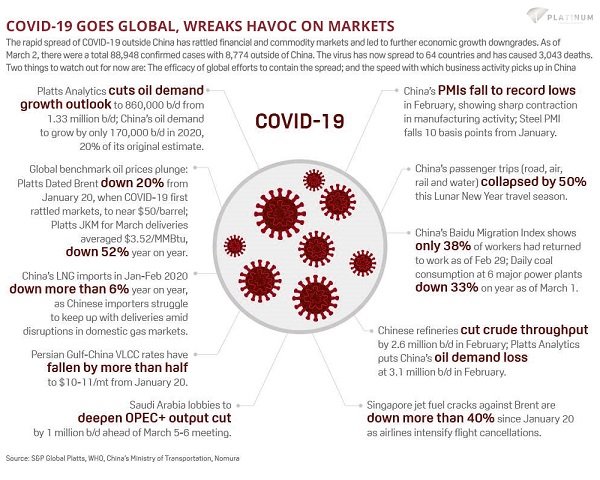
Logical Consequences of Coronavirus Impact on Forex Markets
To determine the consequences on Forex markets of global pandemics, such is the case of Coronavirus, we can look at the impact on stock markets. Stock markets are an excellent gauge of economic activity. Forex markets in the long run follow the developments in each countries’ economy. So, looking at the effects of previous pandemics on the stock market allows us to venture as to how much the Forex market will be affected.
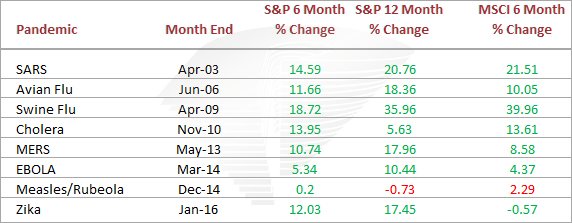
The table above looks at the US stock market and the world-wide index compiled by Morgan Stanley. The US economy is the world’s largest, if that market is affected there will necessarily be repercussions throughout the globe.
What we see from the above table is that there was little negative impact on global economies. Statistically speaking it probably looks like there is a positive correlation between pandemics and positive performance of the stock market. The coronavirus impact on Forex markets may be different. This time governments in certain countries are beginning to take action to try and stop the spread of the epidemic. In some countries imposing quarantines individually or even on whole towns. Stock markets are certainly reacting differently this time round also. Most major stock markets have taken a hit since news of Coronavirus hit the headlines.
LEARN TO TRADE THE FINANCIAL MARKETS TODAY!
How Much Has Coronavirus Impacted Forex Market
Let’s take a look at the coronavirus impact on Forex markets. We can have a look at the impact on the stock markets since the outbreak of the virus in various western countries. I’m going to Take February 3rd as the starting point to look at stock market performance. On that day CNN reported that there had been 426 deaths and more than 20,000 contagions world-wide.
The table below shows the effect of Coronavirus headline news once it hit the market.

Looking at a daily chart of the UK stock market we see a similar pattern. The FTSE 100 was in a sideways trend, with a certain bullish tendency over the previous months, back to August 2019. The lateral price movement was mainly due to the uncertainty created with Brexit. However, the stock market was holding its ground. That is until 24th February when the FTSE tanked. Shares are possibly perceived as the riskiest asset by investors. So, they usually get hit very hard. The FTSE 100 has dropped 20.8% from its high on 24th February. You could say a market rout in all effect, and as the pandemic spreads we probably haven’t seen the full extent of the Coronavirus impact on the Forex market.
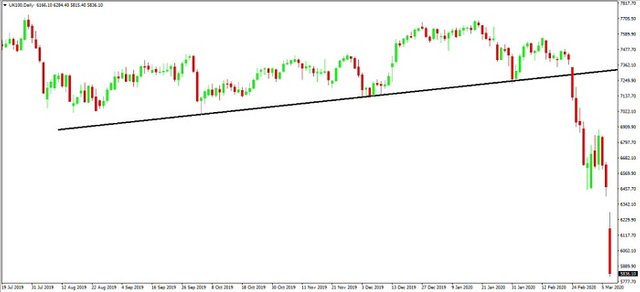
The Coronavirus impact on the Forex markets is inevitable given the strain being taken on all major stock markets. Stock markets are in turmoil because of the possibility this pandemic will restrict economic activity in a great way. This is plausible, as we are seeing restriction of movement to and from large geographical areas, major mass events shut down. And we are not talking only about China.
Watch this video: Coronavirus Latest Updates (03mins 4secs)
Emotional Decision Making a Consequence of Coronavirus Impact on Forex Market
Fear is always a big driving factor in market price action. It also dictates more general social behaviour too. In Italy, whole supermarkets saw their shelves emptied in a single day. This was before any lockdowns were even mentioned, but at the beginning of the spread of Coronavirus. Even now, with hindsight that behaviour seems extremely unnecessary, as supplies are open and regular.
So, it’s reasonable to think that fear also drives masses in the Forex market to take the same action in their trading strategies. This fear has shown a certain pattern. Investors don’t like risk, in general, or rather they want to hold assets that don’t have to much of a bumpy ride. Also add that in times of danger or threats investors will typically favour less risky assets. We have already seen UK short term gilts drive into negative yields. This happens as investors dump risky assets such as stocks to buy low risk government bonds.
We don’t actually have a financial crisis, however, the fear that this may occur is driving the market right now. Investors are acting in accordance to the fact that a financial and economical crisis is just around the corner. So, as market players get emotional and everyone heads for the exit door certain markets will get hit harder than others. Trading strategies tend to align in times of crisis and that includes Forex markets. Everyone knows where the perceived danger is, and they also know where the perceived safety is.
But which currencies show the Coronavirus impact on Forex markets? Let’s have a look at the Japanese yen. We have seen a rush on this currency over the past days. The yen is considered a haven currency, when compared to the US dollar. This might seem surprising but whenever there has been a global crisis the yen has usually appreciated. If the US dollar is considered risky and the yen is considered simply less risky, then USDJPY will simply go south to reflect investor and market preference.
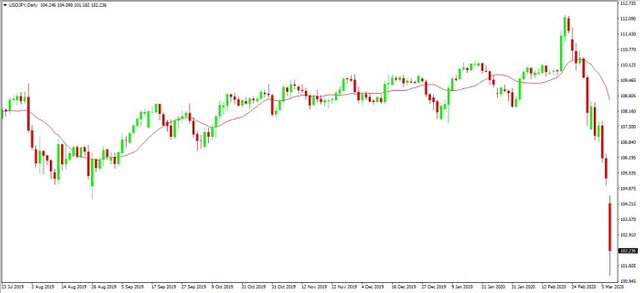
In the chart above we can see the extent of the Coronavirus impact on the Forex market. The chart shows how the yen has appreciated over the past 12 trading days. From a high of 112.22 on 20th February, then an almost vertical slide to a low of 101.18 on 9th March. This has happened as Coronavirus contagion and death toll counts have risen globally. That’s a 9.8% drop in the value of the dollar in just 12 days. There of course is the double effect of the FED interest rate cut on 3rd March, but there is a good amount of fear that pushed the yen so high in such a short amount of time.
Looking at the previous months leading up to the dollar rout, we see a steady upward trend for USDJPY. The Japanese economy hasn’t been developing very well at all for various years now. The most recent data showed GDP shrunk by 7% for the quarter. While the US economy has been racing forward, it seemed a logical rally for this pair. Until the Coronavirus showed up and investors scattered for safety, forgetting all the fundamentals.
If we look at the EURUSD we can see a similar Coronavirus impact on the Forex market. In the chart below we can see how EURUSD touched a low of 1.0778 on 20th February, to then reverse rapidly higher over the following 12 days to reach a recent high on 9th March at 1.1495. That’s a 6.2% Increase. Exceptionally remarkable when the ECB recently cut rates into deeper negative territory and the Euro currency was in a constant slow decline since mid-January. Again, the FED interest rate cut would have helped this rally, but the Coronavirus added extra fuel.
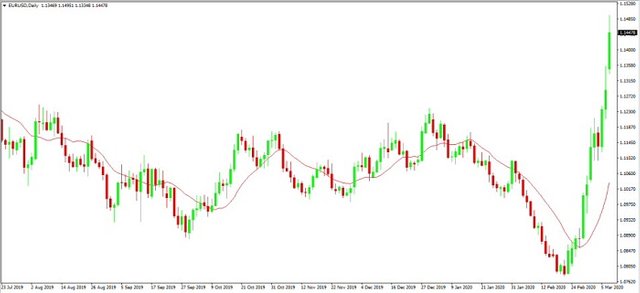
However, the Coronavirus impact on the Forex market will not always be negative for the US dollar. As we mentioned before. Investors prefer a less risky asset to a riskier one. So, with each currency pair a comparison should be made. If we look the Coronavirus impact on the forex markets in emerging markets, we will see that the dollar benefits from the current Coronavirus pandemic.
Let’s take the Mexican peso as an example. The peso had been strengthening since August 2019. True, it was going through a bumpy ride, but is was appreciating in value against the US dollar. Here also, the currency pair hit a turning point on 17th February, where USDMXN reached a recent low of 18.52. It has since then shot up to a recent high of 22.05. That’s an increase of 19.1%, even in emerging markets that’s a big number. Here the fear factor is more evident. If the US dollar rout against the yen and euro were fundamental then there may be some fallout, maybe less, against almost all currencies. Yet against the peso, where the dollar had been losing ground it suddenly shoots up.
In this case the Mexican peso is a riskier asset than the US dollar, so investors dump the peso and buy US dollars. Here the FED interest rate cut should have helped the peso strengthen against its northern neighbour. Yet that was not the case, not even close. As news has been reaching the headlines of more contagions, more deaths, and of possible global economic recession, investors have exited any market which is perceived as risky. End result, the peso took a whacking over the last 12 days, while it had previously been gaining ground against the US dollar.
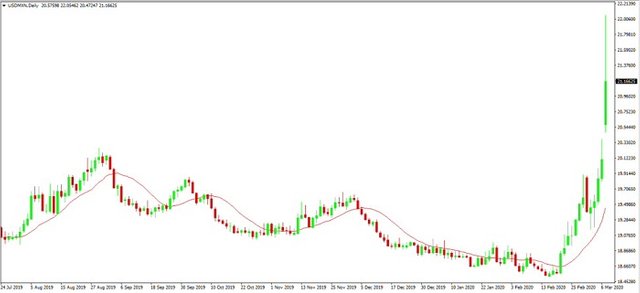
The spotlight is back on shorting the financial markets with some experts suggesting the only safe currency is the dollar. In these times, knowing how to trade the eurodollar could be quite profitable as this represents 43% of the dollar index. We have seen several flash crashes and its times like this in March 2020 where rapidly spreading coronavirus in Europe has all the bears interested in short selling the indices such as ftse 100 and Dax 30. When in doubt stay, is what we have learned from almost 18 years of trading the financial markets. If you would like to learn how to take advantage of these trading opportunities or need help on your current forex trading strategies, please let us know and fill out the consultation form below. As many of you know oil has collapsed almost 30% in one single day if you would like to learn how to trade commodities click here.
Hopefully, you have enjoyed today’s article. Thanks for reading!
Have a fantastic day!
Nisha Patel
Live from the Platinum Trading Floor.